The following is another story by Robert F. Knapp (1913-1994) of his years working on the The Skagit Chief tug boat towing logs on the Skagit River and Puget Sound in Washington State during the 1930-1950s. People mentioned include Captain Charles Elwell (captain and pilot of The Skagit Chief tug boat), Herby Camm (deck hand), and Joe Parker, owner of the tug towing company and the Skagit Chief.
Being a cook on a tug boat, is not quite as simple a job as most people might think. It was my job for close to three years. The only modern thing on the boat was the small toilet at the stern of the craft. It had to be flushed by dumping a bucket of water, drawn from the river. There was always an empty bucket standing near for that purpose. The lights were small six volt bulbs, lit from the power of the generators on the engines that ran the boat. A kerosene lamp was used most of the time as the only source of light at night.
The cook stove was small, but large enough for our purpose. It had a railing around the top to keep things from sliding off during rough navigation, a frequent event crossing the Puget Sound. The boat would roll from side to side far enough to spill things off the stove, making a mess.
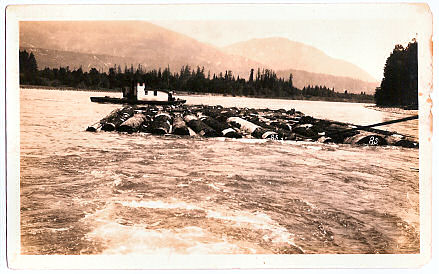 We tended to travel up river a lot during the night. At the small town of Lymen, about four miles up river from Mount Vernon, there was a place where the town dumped sewage into the river. We were not allowed to take on water anywhere near there until we passed that place.
We tended to travel up river a lot during the night. At the small town of Lymen, about four miles up river from Mount Vernon, there was a place where the town dumped sewage into the river. We were not allowed to take on water anywhere near there until we passed that place.
To dip water from the river for cooking, I had a twelve quart bucket with a rope on it. I’ll never forget the first time I dipped water. We were going up river, I dropped the bucket over the side of the boat, and before you could wink your eye, that rope was jerked out of my hand. The bucket went out of sight down river faster than I had ever saw anything go before! I simply didn’t realise how powerful the pull of the water would be. It’s a darn good thing for me that I didn’t have that rope wrapped around my arm, I think it would have jerked my arm right out of the socket!
I told the captain, Charles Elwell, “I just lost the only water bucket we have. I dropped it over the side and the current took it down stream.”
The captain just laughed. “I meant to tell you about that. You have to dip very quick. It’s best to get a little at a time and dip more often.” Then he told me where to find another bucket.
It was my job to see that groceries were kept on hand at all times. I did all the buying. I had to cut the firewood for the cook stove, and see that plenty of wood was on deck at all times. Groceries were bought at Chinns Grocery in Mount Vernon. There was no limit to what I could buy at that store.
There was no refrigeration on the boat, so fresh meats had to be purchased a small amount at a time. We did have a small ice box, I used to keep some meats longer when we had the ice, but we didn’t have ice very often.
Hot cakes, bacon, and eggs were generally served for the morning meal. I bought prepared hot cake flour, so I seldom stirred them from scratch. There was always coffee. For the noon meal, I’d have boiled potatoes, with a flour gravy. Quite often fried pork steak. Some times I would make the gravy out of the juices from the fried steaks. Meat gravy was good for a change. I served baked beans now and then. Scalloped potatoes with canned corn and hot biscuits made up a fine meal.
Quite often the millionaire owner of the ship towing company would come aboard to have a meal with the crew. He generally had a compliment for me, he said, “The crew on this tug feeds better than I do at home!”
I told him, “Mr. Parker, you have a good crew here, this is hard work, if you want a hard job done well, the crew must eat well!”
“Well said my boy, you are doing just fine, keep up the good work!”
There is a place in the Skagit River, just below what is known as “The Dells” where a great boil raised about two feet above the rest of the river. This spot always puzzeled me. But I do know that when the fifty foot tug boat went through this abrupt raise, it seemed to viberate all over, slowing down to a very near stop. This boil is probably thirty feet across and the current has great power at this point. The old captain claimed that an underground river entered into the channel at that place.
Some of the long trips across the Puget Sound were very interesting. On one trip, a terrific storm had came upon us. The waves were six feet high. They splashed over the bow, running down the gunnels like small rivers. Pots and pans toppeled from their perches. The tug bounced around like a large cork on the sea. The captain tried to steer the boat according to his compass. There was no way possible to tell anything by looking. I was scared speachless.
All my firewood was washed overboard during the storm. All I had left was a small bundle by the stove. And that was scattered all over the galley. I’ll never know how we managed to get to the mouth of the river and out of the storm into the calmer river waters. What a wonderful relief. While the galley was a mess, our decks got a good washing if nothing else.
Another time we were coming back from a port across the Sound. It was late at night. The Sound was as smooth as a woman’s breast. I opened the galley door to view the weather outside past the gunnels, filled with herring.
As the boat made way, water splashed over the the bow. Thinking they were herring, I called to the deck hand, “Herby, come look at the herring!”
Herby was asleep on his bunk. When he saw the splashing water before us, he said, “Hell man, those are not herring! They are salt water smelt! Get me a pan and I’ll get you a mess of these in no time. They are the best eating fish you ever tasted!”
Since I didn’t know much about salt water fish, he gave me instructions while he caught the fish. “They are so easy to clean, just roll ’em in flour and fry ’em in a hot skillet, along with hot cakes. You never tasted any-thing better!”
“But what about the fish guts? Don’t you have to clean ’em?”
“Hell no! You take the guts out after you get ’em on your plate. They don’t have but very little guts anyway!”
He caught a large pan full, much more than we could eat. Thousands of them slithered past the galley door. We could have had several hundred pounds of them had we wanted.
That morning we had hot cakes and fried smelt. They were delicious, but the old captain refused to eat even one.
“You couldn’t pay me to eat any of those little things that were cooked with their guts inside!” He had bacon and eggs with his hot cakes. I tried to show the captain how small the insides of the fish were, but the old boy nearly threw up, so I gave up trying. Herby and I ate what we could the rest of them went over-board.
Quite often we would have to weigh anchor and wait for the tide to change. Sometimes it would take several hours. During these waiting periods, Herby and I would take the skiff and head for the clam beds. This always tickled the captain. I think he could eat clams three times a day if he could. It didn’t take long to gather all the clams we could handle. In those days clams were plentiful. I made clam patties, fried clams, and clam chowder. Clam patties went well with hot cakes in the morning. For patties, I ground about fourteen large clams, then added three eggs, mixed with cracker crumbs, and fried in an iron skillet, none of these were ever thrown out, they were all consumed.
I didn’t have to bake bread, pies, or cookies. However, I did bake meat loaves, salmon loaves, and potatoes. No one seemed to care much for sweet stuff. The old captain always said, “Meat and potatoes, the fat of the land. If you can’t eat it, you can starve and be damned!”
I think he lived by that rule. I never argued with the captain.
Most Recent Articles by Robert F. Knapp (1913-1994)
- Poem: Evenin' by Robert Knapp
- Poem: The Little Kids (Robert and Wayne Knapp)
- Knapp Family: Our Introduction to the West in 1930
- Poem: The Good and the Bad by Robert Knapp
- The 1967 Trip Back to Taylor Rapids, Wisconsin


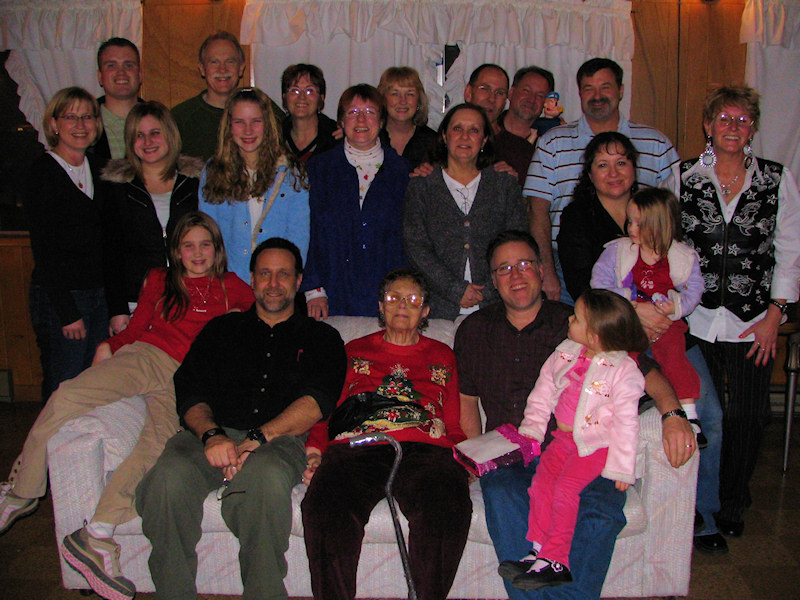
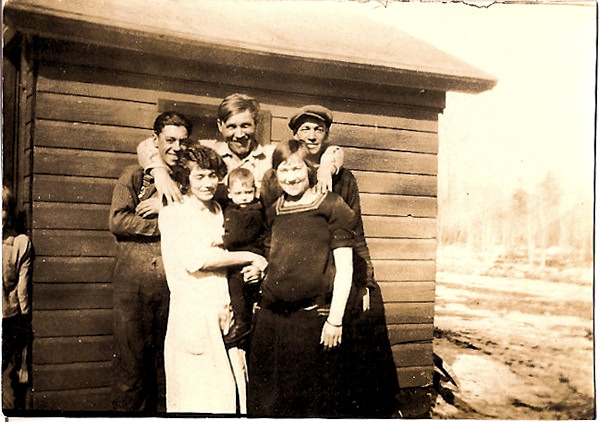
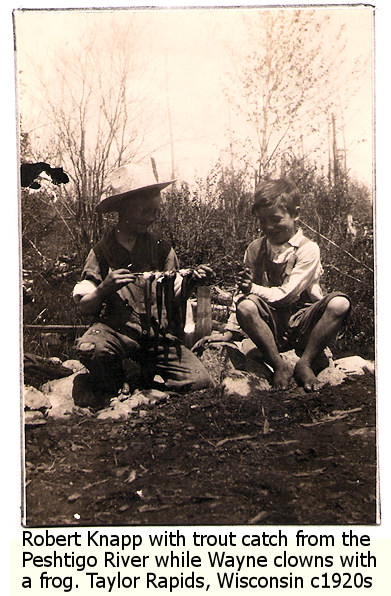
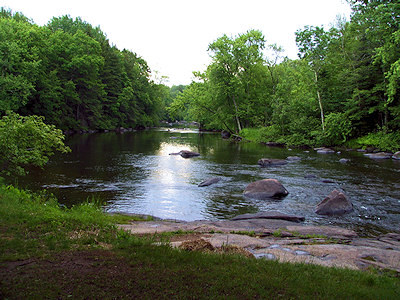
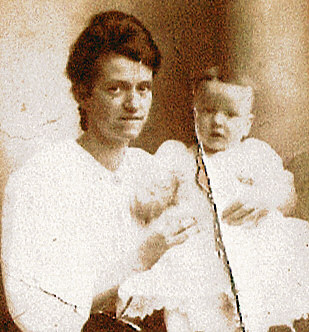
Pingback: West and Knapp Families Featured in the Everett Herald, Snohomish County, Washington | Family History